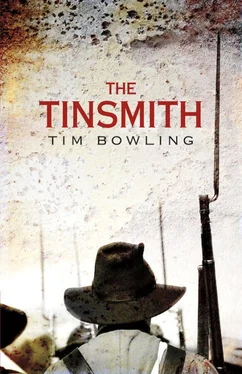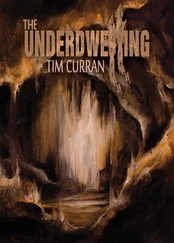When he walked across the barnyard, he saw the doctor, bent over a body, holding a long strip of dirty bandage in one hand. Just beyond him, caught suddenly in the re-emerging sunlight, was a sloppy, sickening, waist-high pile of arms and legs. For a moment, the doctor looked stunned, defeated. He blinked at the long, growing line of waiting wounded and seemed unable to move. He lifted a gore-covered hand and brushed it over his thick beard. A small cluster of flies buzzed near his face. Then he turned and made a sweeping gesture toward a group of civilians standing a few feet away, their hands over their mouths.
“Go on,” he said wearily. “If you’re not going to help, then clear out of the way. For Christ’s sake, this isn’t a circus. Clear out.”
But his voice had grown increasingly weak. He stared at the limb in his hand as if surprised to find it there, then tossed it on the pile and shouted, “Next!”
John offered his assistance and the doctor immediately put him to work.
“Good man. I need you to keep a firm grip on the patient. Here, at the shoulders. Have you ever seen chloroform used before?”
“I’ve seen how it’s done.”
“Not too many drops,” the doctor said, demonstrating with a cloth. “Like this, over the mouth and nose.”
John nodded. A soldier was led forward and he helped him onto the table.
“It’ll be fine,” John said low to the terrified, powder-burned face while keeping a firm grip on a shoulder with one hand and administering the anaesthetic with the other.
“Good man,” the doctor said. “That’s it.”
Time vanished, became a steady succession of torn flesh and broken bone. The stench was awful. It seemed to be a part of the hot sun; the flies seemed to breed out of the light and heat. The doctor no longer put his knife down or even rinsed it; he held it between his teeth as John calmed another soldier and applied the anaesthetic. At some point, the doctor asked him to put pressure on the patient’s arteries, and he did so, calmly, buoyed by his usefulness and the doctor’s confidence in him. The work kept the painful memories away as well as the tension of the immediate future. Not once did he see the overseer’s doglike grin hovering in the air, nor did he feel the letters burning on his cheek.
Darkness came. Candles flickered around the table as the stars emerged. The air was colder but still putrid. Now the doctor’s fatigue was clear; his hand became less sure, the knife cuts ragged. John could not bring himself to point these errors out, but he found that when he lightly coughed or shifted his body, the doctor seemed to come awake and realize what he was doing. Once, when John saw that the doctor was cutting away a great deal more tissue than usual, he had no choice but to speak before the damage was done.
The doctor shook his head and ran his bloody forearm across his eyes.
“Could you lower the candle,” he said. After a brief pause, he sighed and went on. “Thank you. You’ve just saved this man a great deal of grief.”
John did not think that he’d ever felt so alive. Despite the blood and the stench and the fatigue, despite the pitiable pleading of some soldiers to have their limbs cut off, he was almost euphoric. From time to time, meeting the doctor’s dark eyes in the candle glow, he almost believed he was helping Caleb. As the hours passed, this belief deepened, until at last he could not keep his past or his purpose back; both rushed at him in sudden waves that he tried in vain to fight off. He paused, listening. A continuous low rumble spilled out of the night—the sound of troops on the move. All at once his own stillness seemed wrong, a terrible mistake. He was meant to go forward. It was the only way that the brutal memories would not overtake him, the only way that the overseer and the mulatto and his own parentless past would not strike the decisive blow. He had a disturbing sensation that the overseer, too, would move in the night. He couldn’t explain it; it wasn’t a matter of reason, it was a stirring in his blood, a prickling along his nape. He looked one last time at the doctor. He was exhausted and bloodied, yet he kept on. The doctor was white and from the North, he already had freedom. So what was he driving himself for? The doctor’s will suddenly seemed even more miraculous than his own. For a few more moments John remained at the man’s side; it seemed, oddly, the safest place he’d ever known. But the overseer was on the move. He could see him riding. And the image fired his dormant hatred. The letters burned. When the doctor stepped over to the pile of bloody limbs, John quietly slipped away.
Twenty minutes later, he ascended a hollow and approached the house. The closer he drew to it, the more he felt the overseer’s presence, which seeped like a stain out of the walls and across the ground and further blackened the night. John’s mouth was dry, his brow and hands cold. He could not quiet his blood; it rushed in great currents that swept him on. In the yard, moving at a crouch, he suddenly stopped, realizing that he had no plan and no weapon. It was likely he’d be confronting two men—two men long conditioned to being on their guard. They would probably be better fed and rested too. He did not move. His breathing and his heartbeat were too fast, too loud. He forced himself to see the overseer’s face, to hear his voice, to smell his skin greasy with goose and pork fat. He needed the hatred even though it only increased the pounding of his blood.
A light flickered in the parlour window. He crept closer, needing to be sure. Before he even peered through the glass, he knew. His whole body told him. At the table the two faces hung side by side in the faint candlelight, almost touching, the overseer’s rounder and flaccid, like a melon gone to rot, the mulatto’s just the same as ever, round but hard, the forehead ridged and prominent, hanging above the deep-set eyes and full mouth. The two men were tearing into a cooked chicken. John could smell it. The grease of the meat made the overseer’s face shine. Silently the two sets of jawbones worked up and down, almost in unison. He watched, unable to pull away. To kill them seemed as impossible as it was desirable.
Done with the chicken, Orlett lifted a small sack off the floor and dropped it on the table. The mulatto nodded like an excited dog. Orlett began to remove the contents—coins and folded bills. There was a great deal of money. The two men bent so low to the table that they seemed to be lapping water off the surface.
John stared at the shine of the silver and gold as if he was seated at the table, as if the wealth belonged to him. And then he realized that death was not enough, that it was not a practical compensation for all that he’d suffered and witnessed. All his life he’d been property, even when the fact wasn’t so brutal as it had been for the past two years. Suddenly the wealth heaped in front of him was more of his future than the overseer’s death. But the one had to happen so that the other could begin. He began to pant and knew it was starting.
But before he could pull away from the window, he saw Orlett and Cray stiffen and look toward the window. Just then, something struck the glass. A ferocious barking ensued. John fell back, the dog’s teeth inches from his own. He scrambled to his feet and ran. The barn loomed in front of him. Inside, he looked desperately around. If he hid in the hayloft, he’d be trapped there like a treed raccoon, especially if Orlett came out with the dog. He decided instead to crouch in a dark corner behind a barrel. Picking up a shovel from the ground, he hurried into his hiding place, his mind racing. They might not come out with the dog. After all, this was a war zone; the night was tense, they might not bother to check every time the animal barked. He fought to still his blood. A minute passed. His hands clenched the handle of the shovel. Thin shafts of moonlight fell between him and the open barn door.
Читать дальше












